#anthroponymy
Note
I'm guessing now it's the same as Spanish because of imperialism, but did Catalan names originally follow the First name + Second name + Father's surname + Mother's surname naming system?
Yes, nowadays we use both surnames. We can't be sure of what would have happened, but the two surnames we have now were a Spanish imposition in most cases.
Before the 19th century, most Catalan men used only one surname. Only the upper classes had more surnames, since they often wanted to keep stacking titles (think of those really long names of nobles, if you marry into another powerful family and yours is powerful too you wouldn't want either of the lineages to get lost, the most titles you can "collect" the better!). Women could often use two surnames after getting married (their father's and their husband's).
In 1870, the Spanish law decided that civil register should have 2 surnames (first the father's and secondly the mother's) for each person to identify them better. That's how people started to have two surnames.
The most visible effect of this law, however, is the spelling. When Spanish-speaker state officers had to write down Catalan surnames, they would write them down according to Spanish spelling rules. That's why many Catalan surnames have a "Spanishified" spelling, like "Peña" instead of Penya, "Calzada" instead of Calçada, "Lladó" instead of Lledó, etc.
(As for first names, usually we only have 1 except you've been baptized, but that's not an official name and how much those 1 or 2 extra names are counted as part of your name depends on each person or family)
More information about the origin of Catalan surnames below the cut.
In the Middle Ages, Catalans had a name and a "nickname", often referred to a characteristic. Many of our surnames come from here. For example, physical attributes like Roig ("red", red-haired), Tort ("hooked"), Petit ("small"), Rossell ("blond"), Calvet ("balding"), etc; or jobs like Ferrer ("blacksmith"), Fuster ("carpenter"), Carnisser ("butcher"), Oller ("potter"), etc.
Among Catalan people, the use of surnames started being generalized in the 9th century.
In legal documents of the time, we see people are referred by who their father is. If the text was in Latin (even though people already spoke Catalan, Latin was still the most used language in writing), the first name would be in nominative case and the father's name in genitive case; if the text was in Catalan, it would be after the preposition "de", meaning "of" (same meaning as the cases in Latin). For example, Berenguer son of Ramon was Berengarius Raimundi in Latin and Berenguer de Ramon in Catalan.
Genitive case often ends in -is, that's why in Spanish and Aragonese you can find lots of surnames that come from a name+ez. For example: Sánchez would be the son of Sancho, Hernández of Hernán, López of Lope, González of Gonzalo, Rodríguez of Rodrigo, Martínez of Martín... Even nowadays, in Spain, 14 out of the 17 most common surnames are a name+ez! (Source)
This is not the case in Catalan. This Latin-derived surnames didn't become used. We only have 3 surnames with this origin (Peris, Sanxís, and Llopis) and they arrived to us from influence of Aragon, Castile and Navarre. Besides, neither of them is very common, unlike their Spanish equivalents. There was an exception in the Valencian Country, because some areas had a lot of Aragonese people as well as Catalan people or at least a strong Aragonese influence, so there existed more surnames related to the Aragonese ones.
From the 11th century on, the nobles started using the name of their lands as a surname, either after "de" (de Barcelona, d'Empúries...) or in adjective form (Barceló, Tarragó, Giró, Tàrrec). This started in the nobility to know who inherited what territories, but it was soon followed by the lower classes as well.
Lower class people often didn't have a territory to refer to and so they would use a name that made reference to their farmhouse, where they live, or other geographical terms. From here we get many of the most common Catalan surnames such as Riera ("stream"), Torrent ("watercourse"), Puig ("hill"), Pujol ("hill"), Vall ("valley") or Valls ("valleys"), Coma ("mountain pass"), Pomar ("apple orchard"), Vinyes ("vineyards"), Rovira ("oak tree forest"), Ribes ("shores") or simply the names of towns or areas like Solsona, Bages, Segarra, Agramunt, Vila, Canet, Cardona, Cabrera, Güell, Barberà, Cerdà...
All of this applies to men, but it worked differently for women because they weren't considered carriers of lineage in the same right as men, and were seen as under the property of a man (father or husband). In the Middle Ages, Catalan women usually had a feminine version of the father's surname (for example, if the father is Ferrer, she would be Ferrera). After getting married, women sometimes had both the father's and husband's surnames or only the husband's.
Source: Janer Torrens, Antoni (2014), "L'origen dels noms i cognoms catalans. Les arrels antroponímiques que marquen una identitat", II Congrés de la Societat d'Onomàstica i la XXVII Jornada d'Antroponímia i Toponímia de la UB. PDF.
#ask#anonymous#història#llengua catalana#onomastics#name#names#surnames#history#languages#langblr#cultures#catalan#etymology#coses de la terra#anthroponymy#anthroponymics#anthroponomastics#onomatology
100 notes
·
View notes
Note
which sites do you use for names?
i'm sorry 😣 i came up with all the names myself! i use the naver hanja dictionary to look up the characters, but for each name i used elements of chinese anthroponymy, which utilizes strokes, order of characters, and the elements of nature to come up with significant/meaningful names.
for example, jinwol's full name is 여진월 or 余眞月 which is the na yeo (余) as in the "yeo which means i", jin (眞) for truth (eumhun is cham jin) and wol (月) for moon. the jin (眞) character is a common syllable – if you look at the family members i've mentioned before like his father, yeo jinhak and and his great-uncle, the sword saint yeo jinhu, they all share the jin (眞) character. this is typically seen in taoist names of members of the same generation of a family or clan and can be given from master to disciple, but the yeo clan uses the common syllable to denote members of the main family.
i can do a more detailed breakdown on how i come up with names if you want to make one for your mc! i think it's a really fun practice hehe
#anon#it's a complicated process jsfjsj#it's why it takes me foreverrrr#fun fact: hanja anthroponymy is popular with couples!#it examines stuff like compatibility
13 notes
·
View notes
Text
anthroponymy in the bear
Apologies if someone's done this already, but I've been thinking a lot about the names of the characters in The Bear, and how almost nothing in this show is accidental. It's led me to wonder whether the names chosen are also intentional and if they can tell us anything about the characters and their journeys.
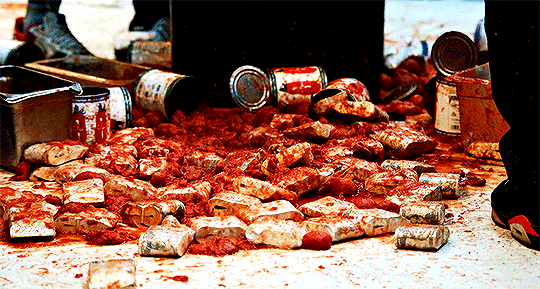
Firstly, we have Michael. The name is derived from a Hebrew phrase meaning ‘who is like god’ (often posed as a question). It’s fitting in my opinion. His character certainly is a godlike presence, his influence and love felt but not seen in The Beef. As the eldest sibling, he’s presented as a leader, and Carmy and Richie worship his vision.
There’s a creation aspect with Mikey. He plays god from beyond the grave, literally breathing life into The Bear through the money he stashed in the tomato cans - we have him to thank for its establishment.
The tomatoes remind me of the bible story of the feeding of the five thousand. In this miracle, Jesus is able to feed five thousand hungry people from just a few loaves of bread and a few fish. In ep 1.08, a humble tin of tomatoes - just as much a symbol of modesty as a loaf of bread - is opened to reveal a wad of cash. From this money comes The Bear, which hopefully will go on to feed just as many hungry mouths, if not more!
Interestingly, 'michelin' is a diminutive of 'Michel', an alternate spelling of Michael. I wonder if there's a connection there? Maybe the key to The Bear earning its Michelin star will lie with Michael? A recipe of his, or a piece of advice he gave Carmy? (Sidetracking, but I just think it’s cool!)
Next, we have Carmy, who’s full name is Carmen. I’ve looked at a few sources, and there seem to be a couple of different meanings for his name. The Latin meaning comes from the word for a song or a poem. The Hebrew meaning is garden or vineyard.
‘Song or poem’ to me reflects Carmy’s creative nature, his love of cooking and drawing. ‘Vineyard’ is interesting, considering that Donna is an alcoholic, and that as far as we know, Carmy is either sober or drinks very little.
Carmen is also a gender neutral name. For me, one of the significant themes of the show is masculinity, and how different ideas of masculinity are warring with each other. To me, Mikey and to an extent Richie represent one particular masculine ideal, one that’s maybe a bit toxic. Carmy meanwhile is not painted as the stereotypical masculine guy. Richie often insults Carmy’s masculinity, jeering at his culinary training, being homophobic, making fun of his lack of experience with women.
There’s so much I could say about this dichotomy, even right down to the dishes that are associated with each character. Richie’s idea of The Beef serving ‘food of the working man’. The sandwiches - their red meat fillings. Mikey’s spaghetti, in its simplicity, its earthiness, its history as a staple food of the working class. To me, it’s a masculine, down to earth dish, very at odds with the fancier, more elegant dishes we come to associate Carmy with.
Then we have characters such as Luca and Marcus - both of whom are associated with baking. You don’t have to be a genius to know that baking is seen as a feminine art. Luca and Marcus arguably don’t fit the macho man ideal either - both of them being depicted as a lot more gentle, calm, and creative types.
Next - Sydney. It’s an Old English name, and there are a few different interpretations of it that I could find. One is ‘wide meadow’ or ‘wide water meadow’.
When Syd breezes into The Beef in ep 1, she’s literally a breath of fresh air. She’s a meadow! Her vision for what the restaurant could be, both in terms of the food served and the way the kitchen could be run (i.e. mutual respect, a smooth chain of command, no psycho bosses) is an idealistic vision, a utopia, a garden of Eden type image.
This brings me to the link with Carmy’s name:
Remember how one of the meanings of Carm’s name was garden? In my opinion, this similarity only reinforces the writer's intentions for us to see Syd and Carmy as kindred spirits. Gardens, meadows… both peaceful, calm, beautiful places. To me, it tells us they’re each other’s peace. It also tells us if they learn how to work together, they can create that ideal vision for the restaurant that they both crave.
Another interpretation of Syd’s name is that it means island or island dweller. This brings to mind the phrase ‘no man is an island’, which to me perfectly summarises her character’s central struggle. The phrase means that humans need each other. We need support, and we can’t do things alone. I think Sydney is shown as someone who can be prone to bottling things up, and maybe finds it difficult to ask for help and to be vulnerable. She’s not shown as having many family and friendship connections, and we see a lot of scenes where she’s alone - eating in restaurants, on the train, cooking at home. In that sense, she is a bit of an island, and I hope we see her become able to rely on others a little more in seasons to come (and hopefully Carmy gets his act together enough for her to trust him to be her support!).
Next up: Jimmy. Short for James, a derivative of the Hebrew Jacob, it means ‘supplanter’. A supplanter means someone who takes the place of something else, like a usurper. Now, in ep 2.06, Jimmy and Donna’s dynamic was a little suspect, and I think a lot of people would agree that we’re supposed to infer something was going on there, with Cicero figuratively and perhaps literally taking the place of Bear senior. My theory is that there was an affair, and that Jimmy is actually Mikey’s father. JAW and Abby Elliott look pretty alike I’d say, while John Bernthal has quite different features. Was this intentional? Who’s to say, but I think there’s definitely a case to be made for there being two different fathers. Equally, Mr Bear could be Mikey’s dad, while Jimmy could be Nat and Carm’s true father - he has their lighter hair and eyes, so who knows!!
In Genesis, Jacob supplants his twin brother by buying his birthright. In the show, Jimmy attempts to buy the restaurant, which of course once belonged to Carmy’s dad. Although the show doesn’t give us the full story of the pair, we gather that Jimmy and Bear Sr. were old friends who were almost more like brothers, until a feud ruined their relationship. Interesting for sure!
Next is Tina. Short for Christina, which means ‘follower of Christ’. Her last name, Marrero, is interesting. Deriving from Spanish, it means stone-breaker or hammer, reflecting her strength of character. She’s a single mother, an immigrant, and has been working in male-dominated kitchens with all these shitty, angry men for years. As far as we know, she was the only woman at The Beef pre-Syd. She dealt with Mikey and Richie’s shit for years. You’d have to be pretty fucking tough.
On the other hand, T is so warm and kind underneath it all and seems able to penetrate through the other character’s exteriors relatively easily - Richie, Carmy, Ebra, Syd. They can all be pretty grumpy, but they all have SUCH a soft spot for Tina and only Tina. She’s the stone breaker to their stony surface! 💖🥰💖🥰
Okay those are the main ones I wanted to talk about, but here’s a few more in brief:
Richie: short for Richard, which means strong or brave ruler/leader. In the final episode, we see Richie leading expo and doing a great job. He’s finally living up to his name - literally finding his purpose.
Donna: means lady in Italian. Madonna, or ‘my lady’ is another name for Mary, Jesus’ mother. The ‘mother of victory’ referenced in the prayer that Carm, Nat and Richie say before the soft open is the same Mary. Whilst Donna definitely doesn’t share many characteristics with Mary, I think the comparison is useful in showing the bear kids’ conflicting view of their mother. They of course still love her and crave her love and her blessing for the restaurant in return.
Natalie: means ‘birth of the lord’, literally, ‘Christmas’. There could be a connection here to the Fishes episode, which takes place on Christmas.
Pete: short for Peter, it means rock. When Jesus made the disciple Peter the first Pope, he said, ‘on this rock I build my church’. Pete is Nat’s rock and I think that’s beautiful!!!!!!
Ebra: short for Ebrahim, an alternate spelling of Abraham, which means 'father of many'. He’s a father figure for The Bear!
I know there are a couple I've left out from the main cast, one being Marcus, whose name means 'follower of Mars', the Roman god. I'm still figuring out whether there's a significance there - I'm sure there could be. Maybe I'll do a part two with the rest of the characters!
Anyways I just think it's neat how fitting a lot of the names are... and I really don't think a lot of them were accidental!
Pls feel free to add on and/or correct me if I got anything wrong!
#yeah i'm riddled with catholic guilt for all eternity but at least i can make the bear meta#the bear#the bear meta#sydcarmy#(tagging sydcarmy cause i know the sydcarmy army love the meta)#sydney adamu#carmy berzatto#the bear hulu#the bear fx#jeremy allen white
140 notes
·
View notes
Text
History of legal Basquephobia
Iñigo Urrutia (1966, Jatabe-Maruri), together with Xabier Irujo, has analyzed the history of legal Basquephobia law by law and rule by rule. The result is the book Historia Jurídica de la Lengua Vasca (1789-2023). To Basque speakers on both sides of the border who are told that we are imposing Basque with every smallest step in favor of our language this work gives us a clear answer: the ones that have been imposed here, with great suffering and in violation of basic human rights, have been the French and the Spanish.

In the last 230 years, how many laws have been passed in the states of France and Spain against the Basque language and the Basque people?
- There are thousands of rules. We have searched the Boletin Oficial del Estado and the former Gaceta, as they can be consulted easily on the internet. Those of the French State we have taken from the Official Journals and previous works on the history of minority languages and the legal history of French.
Are laws against the Basque language or against Basque people?
- This is a very good question, difficult to answer. Basque has always been the target of political power, but behind this there is a historical attitude against the nature of Basques. During constitutional periods, dictatorships, etc., it has always been a constant to oppose our language.
(...) Basque-speaking children who did not know French would suffer terribly - as happened to those who did not know Spanish in the South. Many, to the point of deciding not to pass on Basque to their children.
- We suffered a terrible deculturalization as a people. But on a personal level, from the point of view of freedom and rights, the situation would be dire. Go to a place, completely foreign to you, unable to talk to your friends, suffer punishments for wrongly using the official language, suffer bans, be labeled a traitor against the revolution... "What are we doing here?", many Basques said. International human rights law absolutely prohibits forced assimilation, and this was the case. The violation of human rights extended a lot in our history, in the South until the Republic period, and again during Francoism. Therefore, this genocidal policy against Basque, created during the French Revolution, has lasted until today, for almost 250 years. Basque is now a minority language, but 200 years ago it was the main language in a large part of the territory, so imagine what kind of transformation process the state has caused. However, it must be said that the structuring of the Spanish state has been very slow, that of France has been much stronger and more violent.
At the beginning of the 20th century, we also suffered from xenophobic attitudes against Basques, Bretons, Catalans, etc., for example, the French Minister of Education, Jules Ferry, literally said "the higher races have the duty to civilize the lower races". Did you find many of them?
- Yes, power encouraged this supremacism. Ferry also passed a long-standing language law. He believed that the French were on a different level and wanted to spread this idea through education, a huge attack on many communities. The negative impact of this is very high.

During Francoism, persecution reached all levels. Basque names were banned from being registered in the registry, or the letters k, tx, and b were banned, forcing thousands of names, surnames, and toponyms to change from Basque spelling to Spanish. A century later, these are the laws that have left their mark.
- The attacks against the anthroponymy of the names were very great, because of the spelling and so on. To give a few examples, they also banned Basque on ships, ordered the eradication of Basque phrases and words on matchboxes or went so far as to remove Basque inscriptions from tombstones. And there is a case, from Gernika, where the owners did not erase the Basque inscriptions on the tombstones, the fascist authorities covered them with concrete. Many things were prohibited by the rules, but many other things were made subject to military power. And of course, any activity against public order could be anything, including speaking Basque. Therefore, anything could be done against the conversations in Basque. They were somehow protected by the law. Penalties and fines were also daily. Speaking Basque had no legal protection and could be considered an act against public order. It must be remembered that in many places society was Basque at that time. In Donostia, for example, the Civic Guard was established, it was an organization that aimed to eradicate Basque from the streets. There were usually groups of four and the agents walked around without uniform. They were scattered through the streets, and if someone heard somebody speaking in Basque they told them to speak in Spanish. After that, however, another couple of agents would come closer and if they heard that the citizens were continuing in Basque, they would fine them or beat them, as it is documented. They were strategies to instill fear, so that people would stop speaking Basque in the street.
And in general, what would you highlight from your book?
- That there has been an assimilation process against us, but that the passion, desire and strength of our people to persevere is striking. Despite the laws, decrees, punishments etc. against the Basque language, our people have survived and this gives us a strong character. It proves that we are a nation that wants to own its future.
You start it with Raphael Lemkin's definition of genocide in The Axis Rule, and towards the end you say that [Spanish and French states] wanted to inflict a cultural genocide on the Basques. That's a big word.
- Yes, genocide is a big word, but the book makes clear that the policies against the Basque language have lasted for centuries and have been carried out by all political ideologies. The behavior against our language is not limited to a certain period: in the last 200 years, during constitutional periods, dictatorships, transitions, times of war... the systematic and legal oppression against the Basque language has been deepened. Lemkin's definition of genocide is perfectly met. My partner Xabier is presenting this book at US universities and speaks openly about this genocide.
Source
#euskal herria#basque country#pays basque#pais vasco#euskadi#oppression#Basquephobia#Interview#News#Culture#History#minoritized languages#Hatred
45 notes
·
View notes
Text
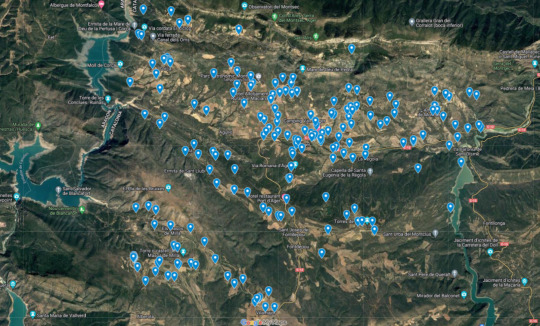
The Arnau Mir de Tost foundation, based in Àger, is a non-profit organization that works to protect the heritage of the Àger Valley. A few years ago, between 2015 and 2016, he produced a study on the farmhouses that were located in the valley itself and its immediate surroundings. An exhaustive work of anthroponymy that shows us the great richness of this type of construction in the area. You can enjoy the work, as well as the farmhouse map, by visiting the following link:
http://fundacioarnaumirtost.cat/projectes/renoms-vall-dager/
By the way, as you can see, Mas Borrell is part of this collection.
0 notes
Text
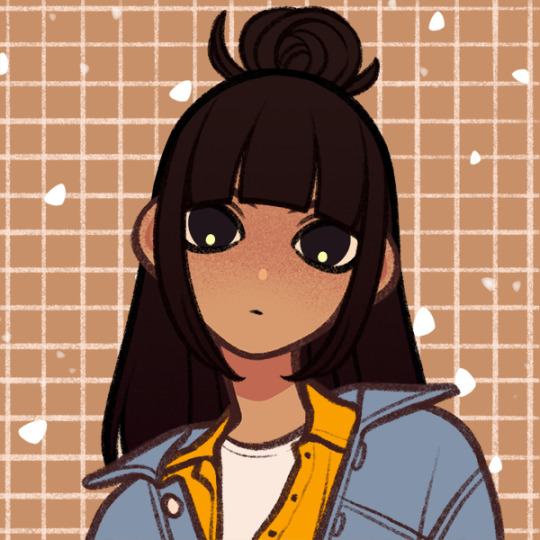
Hello there ! :D
My name is Hailu 🌻 This is my first post on this blog. This is what I look like, more or less. Sometimes, I make snippets of fanfics and moodboards. I like KPOP and follow a variety of groups. Please come and say hi if you would like to speak or ask for a moodboard 🎨
Little facts about me ?
● I got a 100% introverted score at my MBTI test.
● I'm autistic. My special interests include – but are not limited to : KPOP 🎧 crochet 🧶 whales 🐳 greek mythology 🇬🇷 and anthroponymy (which is the study of given names, among other things) 📚
● My birth date only consists of two different number : 1 and 9 ♾️
#hailuspeaks🌻#introduction#this is kind of a side blog actually but i really wanted it to be independent from the other one
1 note
·
View note
Text
Spritelings and Greater Flowerblooms: Anthroponymy (AKA names, names and lots of names!)
To get back in the swing of things, I decided to make an entire post dedicated to everything you might want to know about Spriteling and Flowerbloom names! Buckle up because this might be a pretty long post!
Spritelings
Spritelings generally uses repeating names for any proper noun, especially names! They're usually 1-2 syllables long and repeats 2-3 times. Good examples would be RenRen, LuLu, etc
They also tend to be a bit melodic, and uses softer syllables like l, C, U, etc. They can also use harsher syllables, namely R and Z.
However, this can vary! There's also longer (but still relatively short) names that might not repeat! Like the names of the different ethnic groups. However, this is rare for given names. Some examples of these types of names are Zepyth, Relei and Leishi.
Greater Flowerblooms
Similarly to Spritelings, Flowerblooms also uses short (Usually 2-3 syllables) names. However, they aren't repeating, but are usually palindromic!
They tend to use slightly harsher syllables than spritelings, usually K, X or V.
Similar to spritelings, naming conventions can vary from place to place, and there are trends in names that can change!
Some example of Flowerbloom names are Kuraruk, Xinix and Zuruz.
LuLu may seem like an oddball in this regard, and you'll be right! They're named in spriteling convention. This is because they actually didn't have a name before meeting RenRen, so RenRen gave them the nickname of "LuLu."
0 notes
Photo
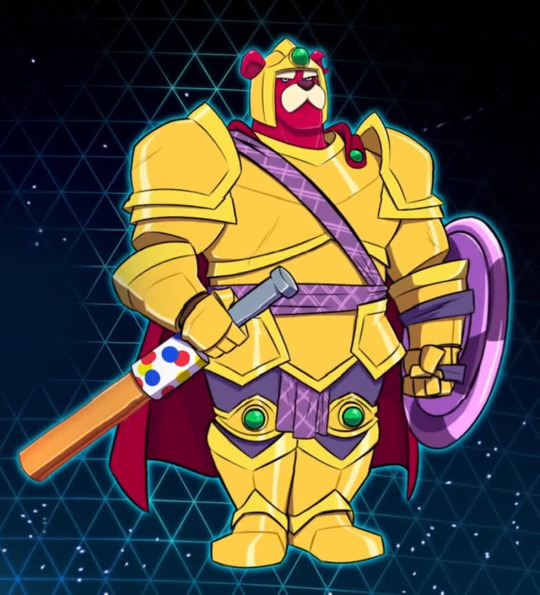
d20 and anthroponymy
Names are cool. “Jawbone” is an excellent name for someone who can rip out a throat with his bite and heal a shattered heart with his words. “Misty Moore” is poetic, fanciful, and melodious—much like the grande dame herself. One of our newer heroes, “Sir Theobald Gumbar,” has an extremely good name, and I suspect Brian Murphy chose it precisely. I have found three things that make it satisfying, and since I notice and value names, I enjoy learning where they are from, why they were chosen, and what they mean. It turns out there is an entire branch of social science that I did not know existed until this week: anthroponymy.
Anthroponymy is the study of human names. Linguists, anthropologists, historians, genealogists, and other experts all lend their talents to uncovering the origins and implications of what we choose to call ourselves, from casual nicknames to broad reaching national identities. Anthroponymy can tell us more about who has lived in an area, how a human group organizes themselves, or what a certain people value most.
For example, in ancient Greece, patrilineage was especially important and it was traditional for a grandson to be named after his grandfather. The philosopher Aristotle was the son of Nicomachus and, keeping custom, named his son Nicomachus. This custom was handy for Aristotle because he was able to his most famous work, the Nicomachean Ethics, after both of them. Since he learned moral wisdom from his father and taught it to his son, his choice of name is especially satisfying.
Anthroponymists focused in the origin of names trace the linguistic roots of our monikers. The original language of the name often lingers long after its meanings are forgotten. But many parents still choose baby names for the meaning as much as the musicality, perhaps hoping that the name shapes the child’s life. Trans folx have the wonderful but stressful experience of naming themselves which most of us will never undertake. Many gamers put so much thought into their character’s name that they struggle more with it than their school of magic or fighter class. Even when we don’t care, we still care a little—random name generator buttons are rarely clicked only once, I have found.
Although it may be simple superstition, the psychological impact of knowing your name’s meaning could factor into your expectations for yourself. Does Emily Axford know that her name means “industrious” and “hardworking,” a fitting name for a focused person who takes copious notes and creates detailed plans? Surely she would be just as productive if her name were Amity (“friendship” & “harmony”), right? There is a theory called nominative determinism that tries to explain why people with the last name Banks might be more likely to pursue a career in finance and why there might be a higher rate of Denises in the field of dentistry. On the other hand, I’m sure it is easy to find a clumsy Grace, a melancholy Ashok, and a Fabian who has never grown or sold a bean. (Yep, Fabian means “bean grower” — even for his own my darling man boy!)
So, what about Sir Theobald Gumbar, who stands ready to protect the royal House Rocks? Why did Murph choose those names in particular? The surname is easy: half of gummy and part of bear (or an anglicized take on the German version, bär). It also has a good tone, a solid ring to it. It sounds substantial when said aloud, which is appropriate for a protector.
Looking at the first name, I already knew that theo means “god” in Greek and that “Theodore” means “gift of God.” The suffix -bald sounds like the Greek root bal- which means “throw”, so I guessed perhaps “God’s throw” or “God strikes.” But I discovered that “Theobald” has no connection to “Theodore” whatsoever and doesn’t originate in Greek.
“Theobald” is a Germanic name, and it means “courageous people,” from theod (“people”) and bald (“brave,” “bold,” “courageous”). When it made its way into French, it became Thibault, and by the time Shakespeare wrote Romeo and Juliet, one variation was Tybalt.
So what’s in a name? One extremely silly reason that “Theobald” fits so well is simple. There are lots of bears in the world with various types of fluff and fur, but only one type of bear is best when it is “bald”: the gummy bear. And it’s not only best when it is bald—it’s awful when it isn’t!
With that unappetizing idea behind us, let’s look again. While I think it would chafe him, Sir Theo could go by a different nickname, which gives us the first real reason it is so fitting. Teddy is usually a nickname for Theodore, but it works for Theobald, too. And there is a great comfort to be found in a protective, armored and highly skilled teddy bear.
The second reason it is a great name: its meaning. Sir Theobald doesn’t think he’s God gift or sent by Bulb. (But I bet Sir Theodore would.) He knows he’s a common man, but he has uncommon courage. He doesn’t hesitate but also isn’t reckless. Theo is dauntless, not rash or cowardly. He is from a brave people. Sir Theo the Bold is very cool. (He’s always been cool! Always!)
Finally, what’s the best reason that Murph chose wisely? “Theobald” is German, and so is the sweet Gummibär! Gummy bears were invented in Bonn, Germany in 1922 by Hans Riegel Sr. After training and working as a confectioner, in 1920 he founded a company you may have heard of: HARIBO! (HA for Hans, RI for Reigel, and BO for Bonn, and all caps always!)
Herr Riegel figured out how to mold sweet and chewy gelatin treats using molds stamped into cornstarch. He decided to call them “little rubber bears”—that is, Gummibärchen! Sold as “Dancing Bears,” these treats were larger but not quite as chubby as the little ones we have today, but in 1960, the iconic Gold-Bären were introduced and became an international success. Today, HARIBO manufactures 160 million Gold-bären every day across the world, using both traditional and vegan recipes.
So there you have it. Sir Theobald Gumbar, the gummibär with the golden armor, was given a wonderful name by Brian Murphy. His name is Irish, by the way. Brian has hazy origins but is likely from the Old Celtic for “noble” and Murphy is derived from the original Gaelic word murchadh meaning “sea warrior.” So Murph, you’re destined to become a noble sea warrior!
Sir Theo will be one first, though, as the Munch Bunch fight off a naval attack on next week’s Dimension 20: A Crown of Candy. Catch up on dropout.tv and watch Wednesday, May 27 at 7PM EDT/4PM PDT on youtube.com/dimension20show!
6 notes
·
View notes
Link
记录在册的最长的英文姓氏?
Leone Sextus Denys Oswolf Fraudatifilius Tollemache-Tollemache de Orellana Plantagenet Tollemache-Tollemache
这个人的名字被1974年吉尼斯纪录认定为「最长的英语姓氏」,然而这其实是一个误解,因为他的姓氏其实只是:Tollemache-Tollemache。
Leone1884年生于林肯郡,是牧师Ralph Tollemache-Tollemache的第6个儿子,在Ralph的众多孩子中排名第八,由他的第二任妻子Dora Cleopatra Maria Lorenza de Orellana所生。与他的许多兄弟姐妹一样,他的父亲给他起了一个非常非主流的名字。
Leone的姓是:Tollemache-Tollemache。
他的父亲Ralph在1853年娶了她的堂妹Caroline Tollemache(她是拉尔夫的伯父Felix Thomas Tollemache)的女儿。
第一任妻子去世后,他于1876年第二次结婚,同时把自己的姓Tollemache改成了一个双姓:Tollemache-Tollemache(这也是他和他妻子的姓)
「de Orellana」源自西班牙的命名习俗,他的母亲正是来自西班牙,这也成为他姓氏前的一部分。
第一个「Tollemache-Tollemache」似乎是一个不太寻常的名字。
因为Leone是第六个儿子,因此得名「Sextus」。
「Fraudatifilius」是拉丁语,意为「被骗之人之子」。
「Leone」则是重复了他哥哥姐姐的命名模式(他们分别叫:Lyonel, Lyonesse, Lyulph, Lyona, Leo, Lyonella和Lyonetta)。
���五个名字的首字母「LSD OF」对应了当时的英国货币单位,L是镑、S是先令、D是便士、O是半便士(ob)以及四分之一便士(farthing)。这可能和他父亲Ralph与第一任妻子的受托人之间的财务纠纷有关。
与之相似,他哥哥的名字是: Lyulph Ydwallo Odin Nestor Egbert Lyonel Toedmag Hugh Erchenwyne Saxon Esa Cromwell Orma Nevill Dysart Plantagenet Tollemache-Tollemache,名字首字母连起来是「LYONEL THE SECOND」。
日常生活中,Leone一般会将他的名字缩写为:Leone Sextus Tollemache。
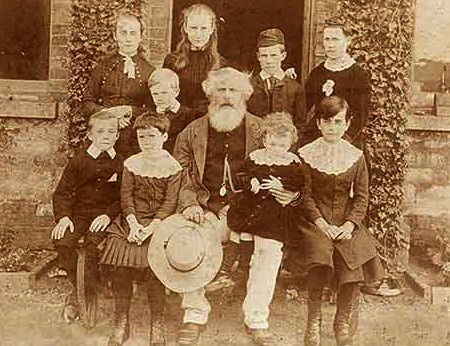
Ralph给孩子起的名字都是极尽古怪之能事,他与第一任妻子生了5个孩子,分别叫:
Lyonel Felix Carteret Eugene Tollemache
Florence Caroline Artemesia Tollemache
Evelyne Clementina Wentworth Cornelia Maude Tollemache
Granville Grey Marchmont Manners Plantagenet Tollemache
Marchmont Murray Reginald Grasett Stanhope Plantagenet Tollemache
与第二任妻子生的孩子名字就更古怪了,分别是:
Dora Viola Gertrude Irenez de Orellana Dysart Plantagenet Tollemache-Tollemache
Mabel Helmingham Ethel Huntingtower Beatrice Blazonberrie Evangeline Vise de Lou de Orellana Plantagenet Toedmag Saxon Tollemache-Tollemache
Lyonesse Matilda Dora Ida Agnes Ernestine Curson Paulet Wilbraham Joyce Eugénie Bentley Saxonia Dysart Plantagenet Tollemache-Tollemache
Lyulph Ydwallo Odin Nestor Egbert Lyonel (LYONEL) Toedmag Hugh Erchenwyne (THE) Saxon Esa Cromwell Orma Nevill Dysart (SECOND) Tollemache-Tollemache
Lyona Decima Veroica Esyth Undine Cyssa Hylda Rowena Adela Thyra Ursuala Ysabel Blanche Lelias Dysart Plantagenet Tollemache-Tollemache
Leo Quintus Tollemache-Tollemache de Orellana Plantagenet Tollemache-Tollemache
Lyonella Fredegunda Cuthberga Ethelswytha Ideth Ysabel Grace Monica de Orellana Plantagenet Tollemache-Tollemache
Leone Sextus Denys Oswolf Fraudatifilius Tollemache-Tollemache de Orellana Plantagenet Tollemache-Tollemache
Lyonetta Edith Regina Valentine Myra Polwarth Avelina Phillipa Violantha de Orellana Plantagenet Tollemache-Tollemache
Lyunulph Cospatrick Bruce Berkeley Jermyn Tullibardine Petersham de Orellana Dysart Plantagenet Tollemache-Tollemache
Leone的哥哥Leo1908年申请改名为Leo de Orellana Tollemache-Tollemache,Leo和Leone都在第一次世界大战中战死。
Tollemache家族的怪异名字,被乔伊斯在《芬尼根的苏醒》中戏仿,比如:Helmingham Erchenwyne Rutter Egbert Crumwall Odin Maximus Esme Saxon Esa Vercingetorix Ethelwulf Rupprecht Ydwalla Bentley Osmund Dysart Yggdrasselmann,首字母的缩写是:HERE COMES EVERYBODY
参考资料:
https://en.wikipedia.org/wiki/Ralph_Tollemache
https://en.wikipedia.org/wiki/Leone_Sextus_Tollemache
http://thedabbler.co.uk/2013/10/the-rev-tollemache-tollemache-naming-names/
0 notes
Note
Edward Little with 3, 13, and 17
thank you!!!!
3. sleep headcanon- modern au: hes totally the type of guy who owns and swears by his weighted blanket
13. nickname headcanon- I actually made a post about this awhile ago asking what people thought Little’s family called him. I think the winner was Teddy but I’m pretty partial to Ned because linguists think it comes from “My Ned” which is a rebracketing of “Mine Ed.” I imagine Little is very close to his mother who probably called him “My Ned” when he was still in the cradle. It’s what he’s called at home but only those who knew him when he was at school at the Naval College or his early days as Midshipman still call him that.
Thank you for this question in particular because I am passionate about anthroponymy!
17. soft spot headcanons- Little isn’t good with children. Actually, quite the opposite. He was always hesitant around children and sometimes outright contemptuous of his very fecund parents but he has a soft spot for his baby sister Janet who was born when he was nearly 14. When he returned from school on holidays and his mother had had enough of him pestering his other sisters, younger brothers, or the servants, she would send him outside to take a turn about the garden with Janet.
13 notes
·
View notes
Text
act like the man/實驗作品_當我是個男人
許多次想要改變名字,人總有些時候需要改變。
I wanted to change my mane, sometimes people want to change.
姓名學在中華文化中是非常重要的,有人願意花大把金錢改名。
The anthroponymy is very important in Chinese culture, some people spend a lot of money to get a great mane.
非常多人認為我是個男人,當他們只看我的名字。
Most people think I am a man when they only saw my mane.
如果我真的在現實中扮演一個男人?
If I act like the man in daily life?
影片中,含有裝扮過程與完成以後。
makeup process and done in this video
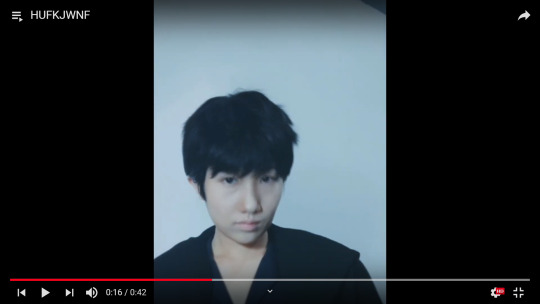
https://www.youtube.com/playlist?list=PLMEdeNB1EML1RTfq6jH8G5JJjYAhR6ean
1 note
·
View note
Note
hi yeri! i was wondering if you could explain the ro's names?
YES OF COURSE i looooove talking about names hehe! i explained how hanja naming conventions work in a longer post here and you can refer to it if you're confused!
jinwol i did before here but i'll explain it a little differently this time! his name 진월 (眞月) is comprised of the characters 眞 for truth and 月 for moon. however it's actually important to note his jin (眞) character changes! his birth name is the character 珍 as in jewel, treasure, or precious, and altogether his name means "precious treasure of the moon" (it's also the name of a cabbage HAHAHA) and when he official becomes a disciple, he adopts a taoist name with his clan's common syllable so the jin (珍) becomes jin (眞).
yul has amnesia and thus is given a new name by jinwol's father – 율 (律) which literally means law, rule, or principle. a no-nonsense name with the intention of having them adopt a common syllable from their taoist master in the future. their name specifically comes from the book of changes quote “师出以律, 否臧凶” from yi shi gua. they receive a courtesy name when they turn 20 instead!
iseul (이슬) i've already explained is the indigenous korean word for "dew" and thus has arbitrary hanja attached to the characters which are 怡 for joy and 瑟 for the guse – her name means "to rejoice at the sound of the guse" and with a little added anthroponymy, her name is a wood/earth element name to balance out her water element!
??? is spoilers and i'm going to go cry over that because i'm very fond of their name 🤒 and also their courtesy name 🤒 their name is very poetic 🤒 please help i'm salty over my own decisions JFASJFSDJJ
#anon#ro: jinwol#ro: yul#ro: iseul#ro: ???#me sowing v me reaping#the identity of ??? is just too much of a spoiler SFJSFJ#help me omg 🥲
27 notes
·
View notes
Text
I need your votes!
I’m dropping a new piece this week and I need to title it before it goes on display! Here’s a sneak peak~

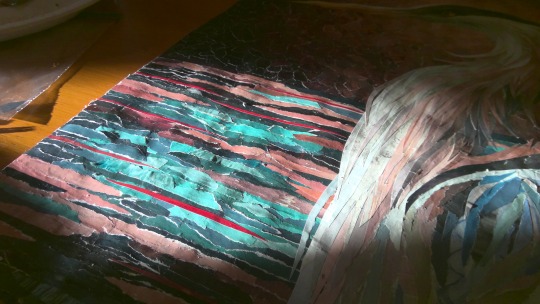
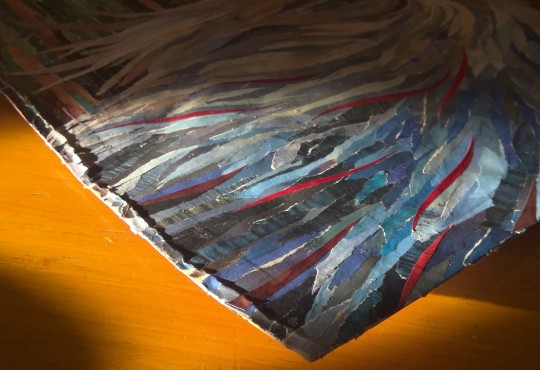
This was a 100+ hour personal project, woven with literal months of blood, sweat, and tears, and as an anthroponymy lover, I want this name to be special. I'm thinking something along the lines of hypnosis and trances because if you've ever locked eyes with a large bird, it's creepy intense. (When asked about my obsession with birds: Well they're the descendants of dragons, of course.)
Some single names brainstorms: Halo (it'll make sense when you see the final, but does the name sound cool?), Dispel, Luminesce, The Trance, stuff like that
Dramatic Adjective + Dramatic Noun format brainstorms:
Fractured Halo
Dark Halo
Fissured Sun(set)
Fissured Halo
Ruptured Sun
Sunset crown
Broken Trance
Crown of Thunder yikes these sound like really bad ya novel titles I'll stop now
AHHH I can't decide! I don't want to let go of this project yet and I think this title procrastination is my way of drawing it out. Please support or shoot down these ideas, or suggest new ones!
EDIT: Okay we're going with "Aura" but it's subject to change 😋
#my art#poll#my rambles#it's been a while since new art bc this project has devoured my life since november#hopefully I'll be putting out way more stuff soon#what did you think that chaghan piece wouldn't be getting a counterpart?#just wait
0 notes
Link
Chapters: 1/1
Fandom: Legion (TV)
Rating: General Audiences
Warnings: No Archive Warnings Apply
Relationships: David Haller & Ptonomy Wallace
Characters: Ptonomy Wallace, Sydney "Syd" Barrett, Melanie Bird, David Haller
Additional Tags: Missing Scene, Season/Series 01, Episode: s01e05 Chapter Five, Character Study, Introspection, Etymology, Non-Consensual Mind Reading, Telepathy, Memories, Background Sydney/David, Psychology, Therapy, Kinda Dark
Summary:
Ptonomy understands people through their memories, but he can't understand David, not the David that came back to them from the Astral Plane.
A S01E05 "Chapter Five" missing scene.
5 notes
·
View notes
Text
Beowulf before Beowulf: Anglo-Saxon Anthroponymy and Heroic Legend
Abstract: The nature of the eponymous hero of Beowulf has long been disputed. Was he drawn from the stock of traditional heroes or was he the poet’s invention? So far, answers to this question have been given on exclusively literary-critical rather than onomastic grounds.
http://ift.tt/2yq9g7s
1 note
·
View note
Link
Dans un livre-événement, Jérôme Fourquet analyse de nombreuses données qui dessinent une société française au stade ultime de la fragmentation.
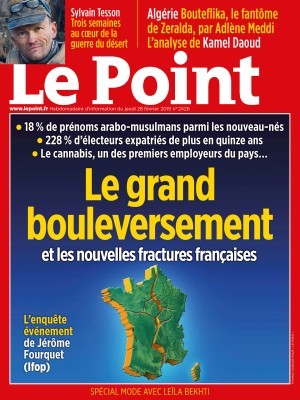
dailymotion
C'est une somme de données et d'analyses qui sera commentée et, à coup sûr, suscitera la polémique. Selon Jérôme Fourquet, directeur du département opinion à l'Ifop, auteur de L'Archipel français (Seuil), la France connaît un véritable bouleversement « anthropologique ». Dislocation des références culturelles communes, fin de la matrice catholique, instauration d'une société multiculturelle, sécession des élites, éclatement du clivage gauche-droite… Notre société est, comme jamais, en voie d'« archipelisation ».
« Nous sommes passés d'une société en silo à une société en millefeuille », explique au Point l'auteur, qui a eu recours à un nombre considérable de données (chiffres de l'Insee, l'Ined, sondages, listes électorales, etc.) pour dessiner la France d'aujourd'hui et de demain.
Premier enseignement : la déchristianisation de la société. De nombreux éléments, allant de la disparition du prénom Marie à la baisse du nombre de prêtres en passant par la diminution du nombre de baptêmes, prouvent que la France est entrée dans une « ère post-chrétienne », comme le décrit le politologue. Les graphiques que nous publions sont, sur ce point, éloquents.
Le livre expose également les résultats d'une anthroponymie. L'auteur a utilisé la base de données de l'Insee recensant l'ensemble des prénoms donnés en France depuis 1900 ainsi que diverses listes électorales. « Nous avons mobilisé cette gigantesque base (...) afin de mettre en évidence différents phénomènes comme la montée en puissance d'un individualisme de masse, l'affranchissement idéologique et culturel des catégories populaires et le regain identitaire », écrit le politologue. La forte hausse de la part des nouveau-nés en 2016 en France portant un prénom arabo-musulman (18 %) risque d'être la plus commentée. Ce chiffre n'est pas isolé. Des hausses similaires sont à noter à propos des prénoms hébraïques et régionaux.
Enfin, en cette période de Gilets jaunes où la France d'en bas se révolte contre celle d'en haut, Jérôme Fourquet produit de nombreux graphiques montrant une réelle sécession des élites, qui se détachent du reste de la société. « Les occasions de contacts et d'interactions entre les catégories supérieures et le reste de la population se raréfient », écrit le politologue dans une enquête qui paraîtra le 7 mars.
0 notes